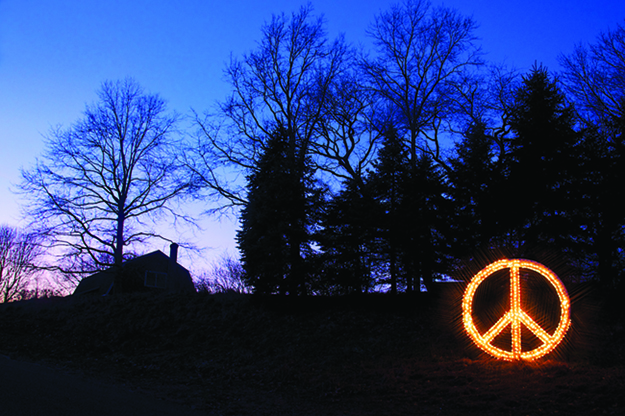Moving Forward: When the news is intolerable

Few of us alive today remember World War II. Europe and Japan were decimated, but except for Pearl Harbor (a big exception), the war played out outside of America.
Goods were rationed and most young men were overseas risking their lives. Every day, the newspapers and radio bombarded those stateside with news, and most of it was pretty bad. How did regular Americans at home carry on with their normal lives?
In our lifetime, those of us of a certain age have seen wars, assassinations, Sept. 11, COVID (remember that?), and some unbearable politics. This month has been another one of those times.
It is fair to say that the news this past month has been excruciating. Horrendous terrorist acts leading to a new war with multiple civilian deaths and burgeoning hate speech. In addition, there’s turbulence on many college campuses, and all of this is added to the now constant drumbeat of political division.
As I started writing this column, I recalled I had written a similar one in the summer of 2021, called “Coping With More Bad News.” The U.S. had just withdrawn from Afghanistan, COVID was re-surging with the Delta virus, and the six overdose deaths in Greenport had just stunned the East End. We were all exhausted.
Now, for so many, exhaustion has turned to helpless anger.
In recent years, we have learned to live with political polarization. As terrible as it has been, it is now a part of American life. And suddenly there’s a new polarization — Israel vs. Gaza. People who are not directly affected by the conflict are drawn into the debate with emotions boiling. At least during World War II, we were all on the same side.
In a recent article in The New York Times, columnist David Brooks asks, “How do you stay mentally healthy and spiritually whole in brutalizing times? How do you prevent yourself from becoming embittered, hate-filled, calloused, over suspicious, and desensitized?”
Heart-wrenching photos of Israeli murder victims and hostages juxtaposed with babies in Gaza hospitals are flooding the airwaves. They are difficult to watch. But we continue to look again and again.
Since the pandemic, experts have written extensively about the psychological dangers of constant news exposure. This 24-hour news cycle, with people constantly refreshing their phones, has become known as “doomscrolling,” a term coined by Karen Ho, a finance reporter. For example, take those pictures of the premature babies in the Gaza hospital.
We’ve all seen them and it is a horrible sight. But are we helping them when we’re seeing these pictures every few hours? It is certainly not helping us. In fact, it probably brings us closer to what David Brooks is warning against.
In my 2021 column I had a few recommendations that I will repeat:
1) Limit news exposure to under one hour per day if possible and choose your news sources carefully.
2) Provide yourself with self-care — as in sleep, exercising, and limiting alcohol.
3) Do not isolate, and do nurture friendships and family relationships.
Unfortunately, things seem to be more complicated now and those earlier recommendations may not be enough. What do you say to the Jewish neighbor who just saw a swastika in her neighborhood? How do you respond to the Muslim community which feels unheard in this country?
We are experiencing two complicated issues: Watching a terrible war unfold across the ocean and feeling even more tension and hatred at home. It can feel soul-crushing.
There are no easy answers, but I will try to offer some suggestions: empathy, kindness, and volunteerism.
Now, more than ever, is a time for empathy. Most people think they are really good at this, but some self-reflection may be in order. Showing true empathy is not easy. The writer and lecturer Brene Brown says that empathy is connecting with people’s emotion even if we are not experiencing the same thing that they are going through.
We are a country that is hurting right now and the best way to de-escalate anger is to listen and try to understand even if we cannot agree. This is not to suggest that we show empathy for anti-Semites and Islamophobes or those trying to exploit the situation.
How many of us knew that International Kindness Day was Nov. 13? There were some lovely postings about it on the Shelter Island Local Facebook page. (Thank you, Jim Colligan.) There is now an initiative to begin to emphasize kindness every day, not just one day a year
Volunteerism is another way to answer the question posed by David Brooks. Taking the time to focus on someone else allows us to transcend our own despair and work on a solution, even if the help is limited in scope. We can’t expect to take on the world’s problems, but any way that we can help a person or group in need keeps us from feeling bitter and desensitized.
Donating money feels good. But donating time is healing. There are so many people on Shelter Island who volunteer for a multitude of causes. I’m sure they would agree.
We must continue to find the good amidst the gloom and doom. ”Doomscrolling” is not the answer. Everyone needs to find their personal light that can coexist in all this sadness. Holding two emotions at the same time may be difficult, but it’s what healthy adults do.
I recently had the good fortune to attend a Judy Collins concert. Judy is 84, and she continues to sing beautifully and continues to be wise. After singing “Amazing Grace,” she closed the concert with these words: “In order to survive on this planet, we have to figure out a way to be inspired.”
Indeed.
Nancy Green is a retired social worker and a member of the Shelter Island Health and Wellness Alliance.








